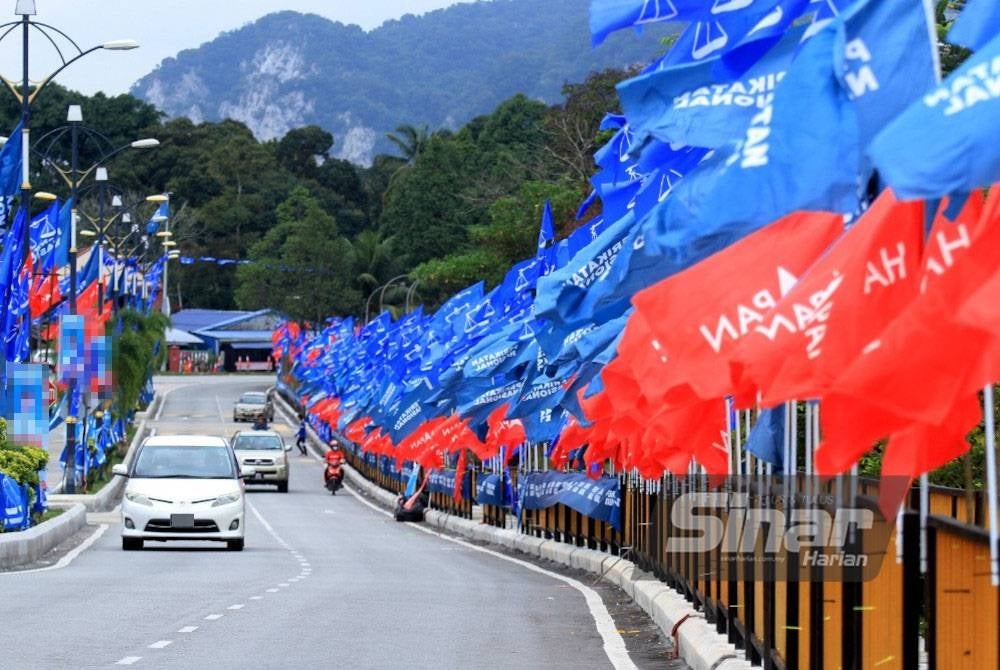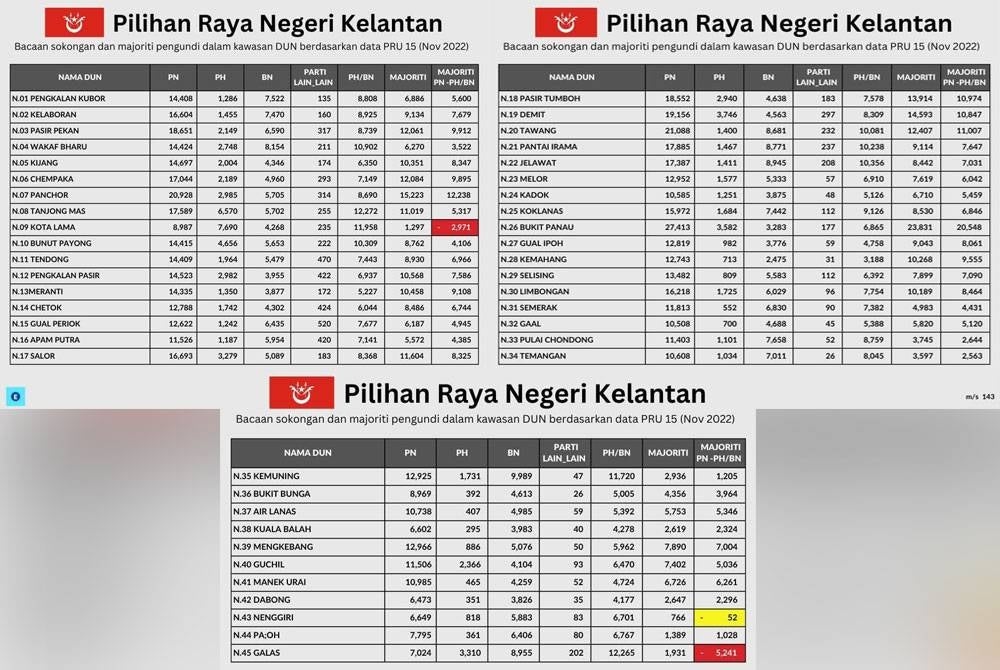State polls: BN-PH coalition hopes to seize three Kelantan state seats
NURUL NABILA AHMAD HALIMY
SHAH ALAM - In the 15th General Election (GE15), the country witnessed a green wave phenomenon when Perikatan Nasional (PN) gained control of the majority of Malay votes and won almost two-thirds of the popular votes in Kelantan.
This showed that Pas, one of PN's component parties, has remained influential in the Che Siti Wan Kembang state since 1990.
Although Kelantan had traditionally been called a Pas stronghold for the past 33 years, Barisan Nasional (BN) still stand a chance to win eight of the 45 state seats in the 14th General Election (GE14).
Among them were Kok Lanas, Bukit Bunga, Gual Ipoh, Air Lanas, Kuala Balah, Nenggiri, Paloh and Galas constituencies which had over 90 per cent Malay populations.
Therefore, even though Pas was comfortable with a big victory in Kelantan, the BN coalition with Pakatan Harapan (PH) might still have a chance to win at least three state seats in the state polls.
Based on the findings of an independent research body, The Elections Lab, the three seats that BN-PH hoped to fall under the umbrella of the unity government in Kelantan in the upcoming state election were Galas, Nenggiri and Kota Lama.

If gauged based on GE15 result data, BN-PH coalition might be able to defend the Galas seat if the votes of the unity government parties were taken into account according to the breakdown of areas.
In GE14, BN candidate Mohd Syahbuddin Hashim won a majority of 1,931 votes of which BN led with 8,955 votes followed by PN (7,024), PH (3,310) and other parties (202).
Therefore, BN-PH total votes of 12,265 in the constituency in GE15 was expected to hand over victory to the party with an expected majority of 5,241 votes given that the turnout rate remained at 67 per cent.
With the distribution of Malay population at 59 per cent in Galas state assembly, BN-PH was believed to command the support of voters of other races of 92 per cent compared to PN with seven per cent, according to a statistical study by The Elections Lab.
Commenting on the chances of BN-PH capturing Kota Lama state assembly even though it was not listed among the eight state seats won by either BN or PH in GE14, the total vote of BN-PH in GE15 could be a game changer in the area.
This is because based on The Elections Lab's study data, BN-PH total vote of 11,958 was able to defeat PN which was leading by 8,987 votes in Kota Lama state assembly with a majority of 2,971 given that the turnout remained at 64 per cent as in GE15.
Among the most significant contributors of BN-PH coalition's potential victory in Kota Lama state assembly was the level of support of non-Malay voters at 87 per cent compared to Malays at 41 per cent.
In the meantime, Nenggiri state assembly had the potential to be won by BN-PH with a slim majority with The Elections Lab's study predicting that the coalition would only have an advantage of 52 votes over PN if the GE15 votes are considered.
However, some political analysts still believed that the state seat in question is 50-50 following the dynamic of BN-PH coalition, which had only recently been formed and was not yet solid.
This matter was influenced by the factor of 54 per cent of Malay voters giving support to PN in GE15 compared to BN-PH which only received 46 per cent.
However, The Elections Lab expected the level of support of voters of other races in Nenggiri to show a positive result for BN-PH with 92 per cent support.
Apart from the influence of Malay voters support, PN also had an advantage in terms of the sentiments of young or first-time voters in the 18 to 40-year-old range who make up the majority of voters in the northern states of the peninsula.
However, those who were said to be captivated by PN's fight via social media such as TikTok had not yet developed a strong political loyalty as their election impact was still dynamic and changing.
Undoubtedly, on paper, BN was most likely to lose the six seats in Kok Lanas, Bukit Bunga, Gual Ipoh, Air Lanas, Kuala Balah and Paloh that it won in GE14 if the dark blue and green wave phenomenon was taken into account in GE15 results.
Nevertheless, it was still too early for PN to be complacent considering that some marginal state seats were predicted to be won by the coalition in Kelantan polls, but based on a narrow majority vote of less than 1,500.
One of them was Paloh state assembly which The Elections Lab's study predicted a PN victory of only 1,028 votes followed by Kemuning state assembly which was expected to record a slim majority of 1,205.
Therefore, it was not impossible that these seats could potentially be won by BN-PH coalition if the rate of voter support declines to as low as the figures in Johor and Melaka elections which were around 53 to 55 per cent only.
In conclusion, despite the expectation that PN would be able to win big and repeat the achievement of sweeping all Kelantan state seats, there were still some factors and loopholes that allowed BN-PH coalition to create an upset on the most intense state poll battlefield in the country's political history so far.














